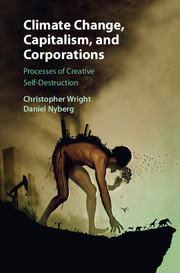Book contents
- Frontmatter
- Dedication
- Contents
- List of figures
- List of tables
- Foreword
- Acknowledgements
- 1 Climate change and corporate capitalism
- 2 Creative self-destruction and the incorporation of critique
- 3 Climate change and the corporate construction of risk
- 4 Corporate political activity and climate coalitions
- 5 Justification, compromise, and corruption
- 6 Climate change, managerial identity, and narrating the self
- 7 Emotions, corporate environmentalism, and climate change
- 8 Political myths and pathways forward
- 9 Imagining alternatives
- Appendix
- References
- Index
1 - Climate change and corporate capitalism
Published online by Cambridge University Press: 05 October 2015
- Frontmatter
- Dedication
- Contents
- List of figures
- List of tables
- Foreword
- Acknowledgements
- 1 Climate change and corporate capitalism
- 2 Creative self-destruction and the incorporation of critique
- 3 Climate change and the corporate construction of risk
- 4 Corporate political activity and climate coalitions
- 5 Justification, compromise, and corruption
- 6 Climate change, managerial identity, and narrating the self
- 7 Emotions, corporate environmentalism, and climate change
- 8 Political myths and pathways forward
- 9 Imagining alternatives
- Appendix
- References
- Index
Summary
Climate change is the biggest challenge of our time. It threatens the well-being of hundreds of millions of people today and many billions more in the future … No one and no country will escape the impact of climate change.
Former UN Secretary-General Kofi Annan (2014)The future looks bleak. As an opening remark, this might seem unduly downbeat; but it is necessarily realistic. Every day we are confronted by fresh evidence that humanity is shuffling ever closer to the abyss. New data and studies are now habitually underlined by dramatic events all around the globe. Fundamental assumptions of our weather, our climate, and our ecosystem are collapsing before our eyes. As environmental activist Bill McKibben (2013a: 745) has argued: ‘We don't need to imagine the future of climate change, because it is already here.’
Of course, the notion of destruction is hardly novel. Any student of economic history knows the idea has been a grim constant in attempts to characterise the relationship between capitalist dynamism and ever-spiralling consumption. Karl Marx and Friedrich Engels ([1848] 1998) warned of enforced destruction. Joseph Schumpeter (1942) championed a dauntless culture of creative destruction. Yet we now find ourselves in a new and altogether more frightening era of so-called progress: the age of creative self-destruction.
We are destroying ourselves. It is as simple as that. Economic growth and the exploitation of nature have long gone hand-in-hand, but they now constitute the most ill-fated of bedfellows. Climate change, the greatest threat of our time, is the definitive manifestation of the well-worn links between progress and devastation. And as we continue to shamble towards a tipping point from which any meaningful return will be utterly impossible, a familiar message rings out from the corporate world: ‘business as usual’.
This book is about that message. It is about the corporate world's relationship with climate change; it is about the terrible paradox at the heart of that relationship; and it is about how that relationship affects us all. It is about how such a message could come to be accepted in the face of the steady annihilation of our planet; it is about how we might recognise it for what it is – the most dangerous of fallacies – and replace it with something more in keeping with our increasingly desperate plight.
- Type
- Chapter
- Information
- Climate Change, Capitalism, and CorporationsProcesses of Creative Self-Destruction, pp. 1 - 27Publisher: Cambridge University PressPrint publication year: 2015
- 1
- Cited by



